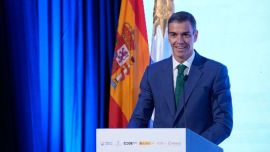Opposition candidate Alberto Fernández swept Argentina’s presidential election on Sunday, ousting pro-market incumbent Mauricio Macri and tilting the nation back toward left-wing populism at a time of economic crisis.
Fernández, a political insider who has never held national office, won 48 percent of the vote with 95 percent of ballots counted, enough to avoid a run-off next month. Macri secured 40 percent, and other candidates divided up the rest.
Macri congratulated Fernández in a brief speech at his campaign headquarters, adding "I invited him for lunch on Monday."
Fernández, who will take office on December 10, spoke shortly afterward to jubilant supporters, standing on a stage alongside his deputy, controversial former president Cristina Fernández de Kirchner.
“Hopefully those who were our opponents during these four years are conscious of what they’re leaving behind and help us rebuild the country from the ashes," he said. He said he’d meet Macri on Monday to discuss the transition.
Fernández’s win signals the return to national power of Peronism. But while voters rejected the austerity of Macri’s government, the outcome was also tighter than expected, reflecting wariness about Fernández’s ability to steer the economy through tricky waters.
After a frenzied final few weeks of campaigning Macri managed to narrow the vote gap from a 16 percentage point deficit in a primary in August – an outcome that spooked markets at the time, sending the peso tumbling and forcing Macri to enact capital controls. His party also fared better than forecast on Sunday in several districts.
“While still a loss, it creates a more balanced Congress and political landscape going forward,” said Jimena Blanco, political research director at consulting firm Verisk Maplecroft in Buenos Aires.
Fernández’s broad promises to improve things will run into immediate difficulty when he is sworn in, given a lack of funds to play with: The economy is contracting, inflation is above 50 percent, unemployment is more than 10 percent and a third of the population lives below the poverty line. Investors also expect the government to default at some point.
Competing demands
Fernández, 60, must satisfy the competing demands of far-left factions in his broad coalition that want more social spending, and the International Monetary Fund, which agreed to a record US$56-billion bailout last year. The IMF will likely have little appetite to dole out more cash if Fernández implements policies that risk a balanced budget.
His victory, and the uncertainty around it, comes at a fragile moment for Latin America. A wave of violent, anti-austerity protests has rocked Chile and Ecuador; Peru faces major political uncertainty; Venezuela’s economy has collapsed; and the presidential election result in Bolivia has been called into question.
"Fernández will have to be a little bit humble about the victory," said Alberto Bernal, chief global strategist at XP Investment in Miami. "The Fernandez win was priced in, but this tight a difference was not priced in."
A key issue will be how Fernández interacts with his powerful vice-president. Fernández de Kirchner was president from 2007 to 2015 and handed Macri an economy damaged by years of Peronism. She was initially expected to run for the top job, and her influence in the new administration will be closely watched.
In her time as president, Fernández de Kirchner raised tariffs, printed money, ignored investors and published economic data that understated inflation and overstated growth. While Fernández’s advisers say he’ll control policies – Fernández de Kirchner kept a very low profile during the election campaign – her popularity helped catapult him to victory and her presence concerns investors.
Now a senator, Fernández de Kirchner faces 11 separate corruption cases. She denies wrongdoing in all of them. Multiple high-ranking officials in her government, including her former vice president, have been convicted on separate graft charges.
Advisers and approaches
Fernández has a broad array of advisers, from traditional policy makers to economists who helped implement Fernández de Kirchner’s policies when she was in office.
On the campaign trail he’s talked about raising salaries and social security payments, boosting exports, cutting interest rates and lowering inflation, all while reaching a fiscal surplus. He’s also spoken about having a “friendly” renegotiation with creditors and the IMF.
The Central Bank will meet Sunday night to analyze the results and potential measures ahead of the market opening on Monday, according to two people with direct knowledge of the matter. A central bank spokesman said financial institutions will open normally.
Macri’s defeat marks a stark finish for a leader who arguably had more international support than any president in recent Latin American history. Elected in 2015, Macri promised to turn around the economy, slash inflation, end poverty and put Argentina back on the world stage with pro-market reforms.
Instead, he struggled to attract foreign investment. His government racked up debt to cover the bloated deficit he inherited from Fernández de Kirchner.
The economy did show promising signs in 2017, and Macri’s party performed strongly in mid-term elections.
But a record drought, falls in global markets, and zigzagging policies dragged the economy into a currency crisis and recession last year. The election uncertainty only compounded the downturn. Macri’s return to the IMF hurt his approval rating, dredging up scars from its last deal with Argentina in 2001, which ended in economic collapse.
Argentina’s economy is now likely to have contracted for three of Macri’s four years in office. Fernandez will take the reins with no easy choices ahead.
"The dynamic between Macri and Fernández in the next 45 days will define and set the tone for the months to come," said Juan Cruz Diaz, director of consulting firm Cefeidas Group. “The strength of the opposition, as a result of a robust electoral performance of Macri, will force Fernández to negotiate to advance his agenda."
– BLOOMBERG
by Patrick Gillespie & Jorgelina do Rosario, Bloomberg

























Comments